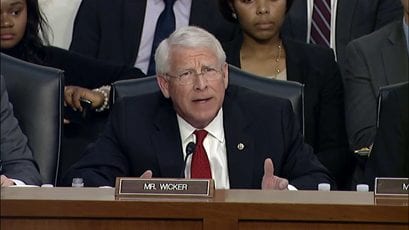
Miss. Senator Asks If the Platform Tracks Users’ Phone Calls, Browsing History
U.S. Senator Roger Wicker, R-Miss., Chairman of the Senate Subcommittee on Communications, Technology, Innovation, and the Internet, today attended a joint hearing of the Senate Commerce Committee and Senate Judiciary Committee featuring Facebook CEO Mark Zuckerberg. The hearing follows reports that personal information from tens of millions of Facebook users was collected and sold in violation of Facebook’s terms of service.
Wicker asked Zuckerberg about Facebook’s reported collection of call and text histories on Android phones as well as its treatment of minors who use the company’s apps. He followed up with a question about Facebook’s ability to track users after they log off the platform.
The Senator also asked the CEO if he believed there should be consistent privacy protections across the entire internet ecosystem based on the type of consumer information being collected, used, or shared.
Today’s hearing comes after Wicker warned against overregulating the internet on Monday. The senator noted in a number of local and national television appearances that the internet and its companies have been a driving force of the modern economy over the past two or three decades.
A full transcript of the exchange is below:
SENATOR WICKER: Mr. Zuckerberg, thank you for being with us. My question is going to be sort of a follow-up on what Senator Hatch was talking about, and let me agree with basically his advice that we don’t want to overregulate to the point where we’re stifling innovation and investment. I understand with regard to suggested rules or suggested legislation there are at least two schools of thought out there. One would be the ISPs, the internet service providers, who are advocating for privacy protections for consumers that apply to all online entities equally across the entire internet ecosystem. Now Facebook is an edge provider on the other hand. It’s my understanding that many edge providers such as Facebook may not support that effort because edge providers have different business models than the ISPs and should not be considered a like service. So do you think we need consistent privacy protections for consumers across the entire internet ecosystem that are based on the type of consumer information being collected, used, or shared regardless of the entity doing the collecting or using or sharing?
ZUCKERBERG: Senator, this is an important question. I would differentiate between ISPs, which I consider to be the pipes of the internet, and the platforms like Facebook or Google or Twitter, YouTube that are the apps or platforms on top of that. I think in general the expectations that people have of the pipes are somewhat different from the platforms, so there might be areas where there needs to be more regulation in one and less in the other, but I think that means there’s going to be other places where there needs to be more regulation of the other type. Specifically though on the pipes. One of the important issues that that I think we face and have debated is —
WICKER: When you say pipes you mean?
ZUCKERBERG: ISPs. I know the new net neutrality has been a hotly debated topic and one of the reasons why I have been out there saying I think that that should be the case is because I look at my own story of when I was getting started building Facebook at Harvard. I only had one option for an ISP to use and if I had to pay extra in order to make it so that my app could potentially be seen or used by other people then we probably wouldn’t be here today.
WICKER: Okay well, but we’re talking about privacy concerns, and let me just say we will have to follow up on this, but I think you and I agree this is going to be one of the major items of debate if we have to go forward and do this from a governmental standpoint. Let me just move on to another couple of items. Is it true that as was recently publicized that Facebook collects the call and text histories of its users that use Android phones?
ZUCKERBERG: Senator, we have an app called Messenger for sending messages to your Facebook friends, and that app offers people an option to sync their text messages into the messaging app and to make it so that, so basically, so you can have one app where it has both your texts and your Facebook messages in one place. We also allow people the option.
WICKER: You can opt in or you can opt out of that?
ZUCKERBERG: Yes.
WICKER: Is it opt out?
ZUCKERBERG: It is opt in. You have to affirmatively say that you want to sync that information before we get access.
WICKER: Unless you opt in, you don’t collect that call and text history?
ZUCKERBERG: That is correct.
WICKER: And is that true for, is this practice done at all with minors, or do you make an exception there for persons aged thirteen to seventeen?
ZUCKERBERG: I do not know. We can follow up.
WICKER: Okay, that let’s do that. One other thing, there have been reports that Facebook can track a user’s internet browsing activity even after that user has logged off of the Facebook platform. Can you confirm whether or not this is true?
ZUCKERBERG: Senator, I want to make sure I get this accurate, so it’s probably better to have my team follow up.
WICKER: You don’t know?
ZUCKERBERG: I know that the people use cookies on the internet and you can probably correlate activity between sessions and we do that for a number of reasons, including security, and including measuring ads to make sure the ad experiences are most effective, which of course people can opt out of. But I want to make sure that I’m precise –
WICKER: Get back to me, sir. Would you also let us know how Facebook discloses to its users that engaging in this type of tracking gives us that result?
ZUCKERBERG: Yes.
WICKER: And thank you very much.











